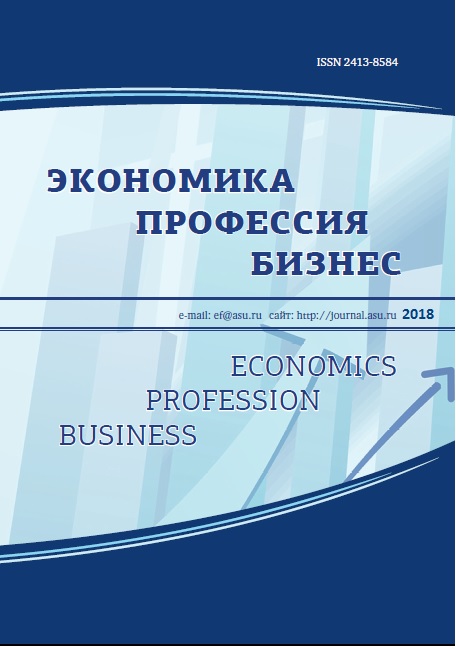SECURING GROWTH AND REGIONAL ECONOMY UNDER ENVIRONMENTAL LIMITS
Abstract
In the article, reproductive processes are studied from the standpoint of the methodology of systemic consideration of production and ecology. As a result, the formula for the cost of the produced product is adjusted, including the parameters of the external environment. The considered system principles and models are tested at the meso-economic level. The principal possibility considering the influence of the production factor on the utility and damage criteria, based on the socio-demographic and ecological dimension, is discussed. The main indicators that characterize the impact of economic activity on the environment on the materials of the Altai Territory are given. The concepts of regional economy are explored, and regression dependencies are established between the main indicators reflecting the processes of accumulation and neutralization of production and consumption wastes. These regressive dependencies reflect both the dynamics of changes in fixed production assets and intermediate consumption over time and establish the relationship between their change and the change in the indicators depending on them-the gross regional product, the volume of emissions from production waste and the amount of used and neutralized production waste. The proposed model and the forecasted indicators derived from it are intended to assess the level of waste from the growth of GRP and the calculation of economic damage for the region.Downloads
Metrics
References
Алтайский край в цифрах. 2007–2012: крат. стат. сб. / Территориальный орган Федеральной службы государственной статистики по Алтайскому краю. Барнаул, 2013. 216 с.
Алтайский край в цифрах. 2011–2015: крат. стат. сб. / Территориальный орган Федеральной службы государственной статистики по Алтайскому краю. Барнаул, 2016. 248 с.
Егоров В. И., Мельберт А. А., Михайлов А. В. и др. Анализ состояния окружающей среды в регионах Российской Федерации // Мир науки, культуры, образования. 2013. № 5 (42). С. 457–459.
Зарнадзе А. А. О взаимосвязи ноосферной идеологиии гомеостатических методов управления // Управленческие науки. 2016. № 3. С. 18–29.
Клейнер Г. Б. Исследовательские перспективы и управленческие горизонты системной экономики // Управленческие науки. 2015. № 4. С. 53–60.
Корнаи Я. Системная парадигма // Вопросы экономики. 2002. № 5. С. 4–22.
Маркс К. Капитал. Критика политической экономии / пер. с нем. П. Н. Клюкина, М. А. Бунятяна. М., 2012.
Михайлов А. В., Тейхреб Н. Я. Образование и переработка отходов пищевой промышленности в Алтайском крае // Ползуновский вестник. 2015. № 2. С 59–63.
Прогноз социально-экономического развития Алтайского края на 2018–2020 годы [Электронный ресурс]. URL: http://www.altairegion22.ru/region_news/bazovyi-i-tselevoi-varianty-prognozasotsialnoekonomicheskogo-razvitiya-altaiskogo-kraya-na-2018–2020‑gody-obsuzhdayut-chleny-pravitelstva-regiona_621313_html/ (дата обращения 10.12.17).
Территориальный орган федеральной службы государственной статистики по Алтайскому краю. [Электронный ресурс]. URL: http://akstat.gks.ru/ (дата обращения 10.12.17).
Тютюкина Е. Б., Седаш Т. Н., Данилов А. И. Экономические инструменты обеспечения охраны окружающей среды: управленческий аспект // Управленческие науки. 2015. № 4. С. 53–60.
REFERENSES
Altayskiy kray v tsifrakh. 2007–2012. (2013). Territorial’nyy organ Federal’noy sluzhby gosudarstvennoy statistiki po Altayskomu krayu. Barnaul (in Russian).
Altayskiy kray v tsifrakh. 2011–2015. (2016). Territorial’nyy organ Federal’noy sluzhby gosudarstvennoy statistiki po Altayskomu krayu. Barnaul (in Russian).
Yegorov, V. I., Melbert, A. A., Mikhaylov, A. V. et al. (2013). Analiz sostoyaniya okruzhayushchey sredy v regionakh Rossiyskoy Federatsii. Mir nauki, kul’tury, obrazovaniya, 5 (42), 457–459 (in Russian).
Zarnadze, A. A. (2016). O vzaimosvyazi noosfernoy ideologiii gomeostaticheskikh metodov upravleniya. Upravlencheskiye nauki, 3, 18–29 (in Russian).
Kleyner, G. B. (2015). Issledovatel’skiye perspektivy i upravlencheskiye gorizonty sistemnoy ekonomiki. Upravlencheskiye nauki, 4, 53–60 (in Russian).
Kornai, YA. (2002). Sistemnaya paradigma. Voprosy ekonomiki, 5, 4–22 (in Russian).
Marks, K. (2012). Kapital. Kritika politicheskoy ekonomii. Moscow. Eksmo. (in Russian).
Mikhaylov, A. V., Тeykhreb, N. Y. (2015). Obrazovaniye i pererabotka otkhodov pishchevoy promyshlennosti v Altayskom kraye. Polzunovskiy vestnik, 2, 59–63 (in Russian).
Prognoz sotsial’no-ekonomicheskogo razvitiya Altayskogo kraya na 2018–2020 gody. Available from: http://www.altairegion22.ru/region_news/bazovyi-i-tselevoi-varianty-prognoza-sotsialnoekonomicheskogorazvitiya-altaiskogo-kraya-na-2018–2020‑gody-obsuzhdayut-chleny-pravitelstva-regiona_621313.html/ Accessed on 10.12.2017 (in Russian).
Territorial’nyy organ federal’noy sluzhby gosudarstvennoy statistiki po Altayskomu krayu. Available from: http://akstat.gks.ru/ Accessed on 10.12.2017 (in Russian).
Tyutyukina, Ye.B., Sedash, T. N., Danilov A. I. (2015). Ekonomicheskiye instrumenty obespecheniya okhrany okruzhayushchey sredy: upravlencheskiy aspekt. Upravlencheskiye nauki, 4, 53–60 (in Russian).
Copyright (c) 2018 Economics Profession Business

This work is licensed under a Creative Commons Attribution 4.0 International License.
Economics Profession Business is a golden publisher, as we allow self-archiving, but most importantly we are fully transparent about your rights.
Authors may present and discuss their findings ahead of publication: at biological or scientific conferences, on preprint servers, in public databases, and in blogs, wikis, tweets, and other informal communication channels.
Economics Profession Business (EPB) allows authors to deposit manuscripts (currently under review or those for intended submission to EPB) in non-commercial, pre-print servers such as ArXiv.
Authors who publish with this journal agree to the following terms:
- Authors retain copyright and grant the journal right of first publication with the work simultaneously licensed under a Creative Commons Attribution License that allows others to share the work with an acknowledgement of the work's authorship and initial publication in this journal.
- Authors are able to enter into separate, additional contractual arrangements for the non-exclusive distribution of the journal's published version of the work (e.g., post it to an institutional repository or publish it in a book), with an acknowledgement of its initial publication in this journal.
- Authors are permitted and encouraged to post their work online (e.g., in institutional repositories or on their website) prior to and during the submission process, as it can lead to productive exchanges, as well as earlier and greater citation of published work (See The Effect of Open Access).









